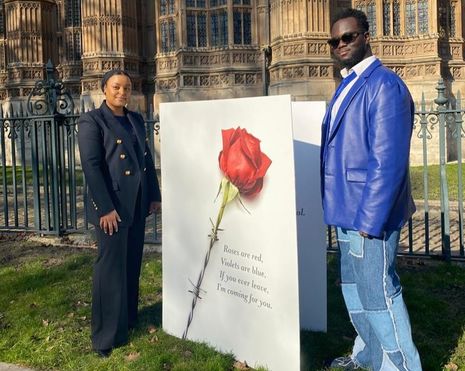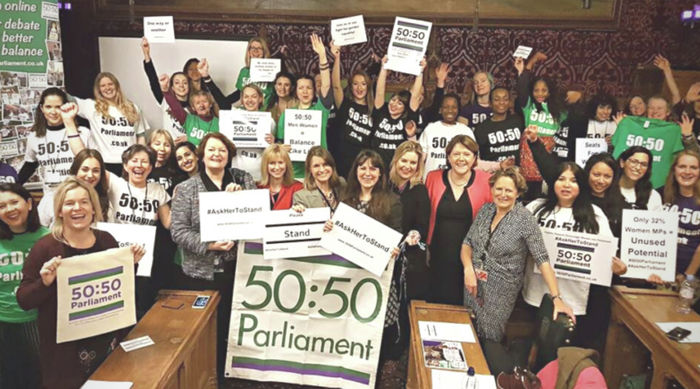‘The government does not take prevention seriously’: the student campaigning for greater education on domestic abuse
Georgie Atkinson speaks to Faustine Petron about her campaign ‘Make it Mandatory’, what she is fighting for and why increasing education is so important

Content note: discussions of domestic abuse and abusive relationships
At Cambridge, you can never be sure what someone does in their spare time — everyone seemingly juggles being a Blues athlete, being in their College choir and topping Tripos. Faustine Petron is one of these people who happens to be enacting change on a societal level whilst also being a second year HSPS undergraduate. In the summer vacation of last year — when I was probably whiling away the days writing largely mediocre Varsity articles — Faustine, as part of a group of eight friends from marginalised communities, launched the grassroots campaign ‘Make it Mandatory.’
The campaign is calling on the government to prevent domestic abuse and controlling and coercive behaviour among young people through education. Within six months of launching, the campaign it amassed 94,000 signatures, and was handed into Number 10 on Valentine’s Day of this year. Notable supporters of the campaign include Top Boy actor Saffron Hocking as well as MP’s such as Layla Moran, Caroline Lucas, and John McDonnell, in addition to a further twelve.
"“[The current government] do not see it as a university student issue”
I sat down with Faustine to understand the catalyst behind starting the campaign and the next steps the government and institutions such as Cambridge could make to support it.
In the wake of personally experiencing an abusive relationship in her later teens, Faustine applied to Cambridge and undertook her A-Levels, all while in the middle of the trial prosecuting the man. He would later be sentenced to a custodial sentence in her first year at Cambridge for the abuse perpetrated against her. Bored in her room one day, Faustine took the opportunity to look into the small print of the Relationship and Sex Education (RSE) curriculum. She noted that it was only compulsory up to Year 11, which leaves a significant gap in the education on domestic violence and coercive control within relationships for those between the ages of 16 to 19.
Faustine notes in our conversation that research conducted by the ONS (Office for National Statistics) highlighted that women aged 16 to 19 report more domestic abuse than those aged over 25. It is this fact that Faustine feels most strongly on — and why she is pushing especially hard for the government to extend the education on domestic abuse to these year groups.
“There isn’t enough support or signposting on a college or a university level”
I ask Faustine what the governmental response had been given the campaign calling attention to this gap in the current curriculum. To date, while the campaign has gathered cross party support, the answer from central government and the Department of Education has been what seems like “a repeated copy and paste response.” The response stated that ‘the department does not provide a national curriculum for post 16 beyond key stage 4’. Faustine stresses that this speaks to the fact that the current government “do not take prevention seriously nor do they see it as a university student issue.”
The necessity for these prevention-based strategies can be seen in the 10,000 comments on the campaign’s petition page. The sentiment of the comments are similar — if there was a level of education on differing forms of domestic abuse available to those between the ages of 16 to 19, it would be a positive preventative strategy in the lives of many.
Curious to understand how the campaign fits into the backdrop of Cambridge, I move our conversation onto the discussion of misogyny within the University and whether this was related to a lack of education regarding healthy romantic relationships at school. Faustine notes that there is seemingly a “sinister predatory undertone” whereby colleges tend to turn a blind eye to an untoward JCR culture. “There isn’t enough support or signposting, on a college or a university level.” Faustine acknowledges that the next phase of the campaign would be targeting university institutions to support the campaign, as well as to make sure that, when freshers come to university, they are in the best possible mindset to understand what a healthy romantic relationship looks like.
In terms of what students can do to support the campaign, Faustine highlights that they can sign the petition itself, and calls on the University to support this and similar campaigns. If students need to seek support themselves, the Charity Refuge’s National Domestic Abuse Helpline can be found on 0808 2000 247.
Gaining 94,000 signatures in six months is no mean feat, and it is a testament to the work of Faustine and her team that they have achieved this much. The lasting thought that Faustine leaves me with is that it is up to institutions such as Cambridge whether they remain complicit in upholding these structures or whether they support campaigns such as this to enact change.
Faustine’s petition can be found here: https://www.change.org/p/make-learning-about-domestic-abuse-and-coercive-control-compulsory-in-sixth-form-and-16-19-academies-educationgovuk
 News / Hundreds of Cambridge academics demand vote on fate of vet course20 February 2026
News / Hundreds of Cambridge academics demand vote on fate of vet course20 February 2026 News / University Council rescinds University Centre membership20 February 2026
News / University Council rescinds University Centre membership20 February 2026 News / Judge Business School advisor resigns over Epstein and Andrew links18 February 2026
News / Judge Business School advisor resigns over Epstein and Andrew links18 February 2026 News / Petition demands University reverse decision on vegan menu20 February 2026
News / Petition demands University reverse decision on vegan menu20 February 2026 News / Caius students fail to pass Pride flag proposal20 February 2026
News / Caius students fail to pass Pride flag proposal20 February 2026










